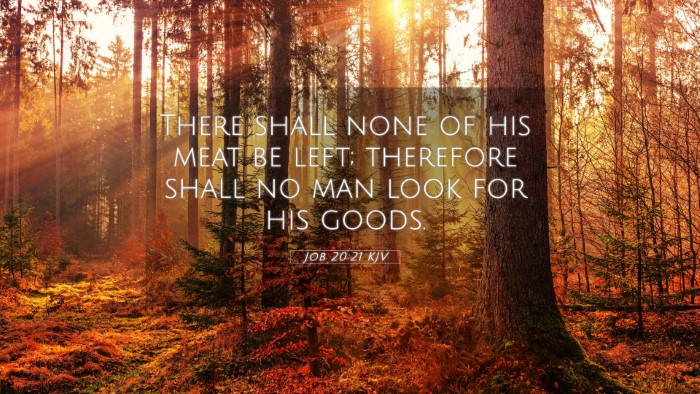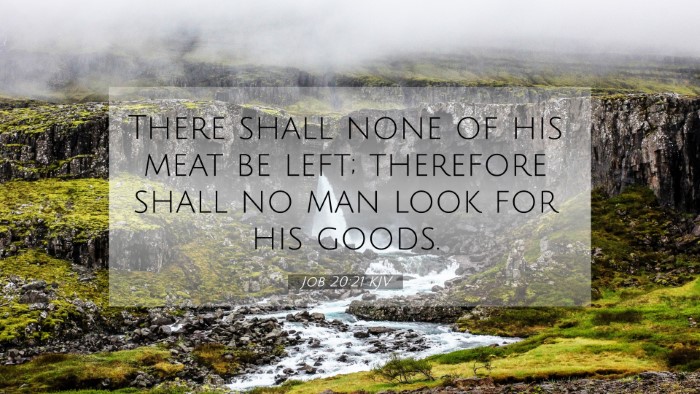Old Testament
Genesis Exodus Leviticus Numbers Deuteronomy Joshua Judges Ruth 1 Samuel 2 Samuel 1 Kings 2 Kings 1 Chronicles 2 Chronicles Ezra Nehemiah Esther Job Psalms Proverbs Ecclesiastes Song of Solomon Isaiah Jeremiah Lamentations Ezekiel Daniel Hosea Joel Amos Obadiah Jonah Micah Nahum Habakkuk Zephaniah Haggai Zechariah MalachiJob 20:21 Similar Verses
Job 20:21 Cross References
There shall none of his meat be left; therefore shall no man look for his goods.
Uncover the Rich Themes and Topics of This Bible Verse
Listed below are the Bible themes associated with Job 20:21. We invite you to explore each theme to gain deeper insights into the Scriptures.
Job 20:21 Cross Reference Verses
This section features a detailed cross-reference designed to enrich your understanding of the Scriptures. Below, you will find carefully selected verses that echo the themes and teachings related to Job 20:21 KJV. Click on any image to explore detailed analyses of related Bible verses and uncover deeper theological insights.
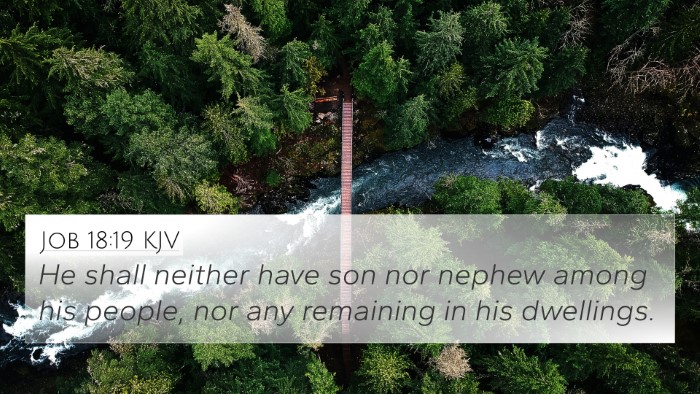
Job 18:19 (KJV) »
He shall neither have son nor nephew among his people, nor any remaining in his dwellings.
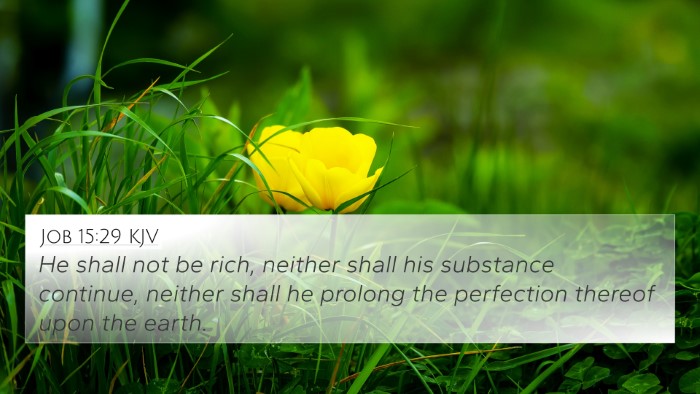
Job 15:29 (KJV) »
He shall not be rich, neither shall his substance continue, neither shall he prolong the perfection thereof upon the earth.
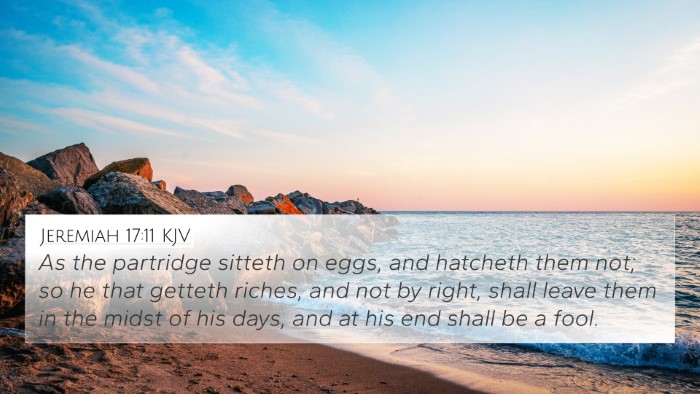
Jeremiah 17:11 (KJV) »
As the partridge sitteth on eggs, and hatcheth them not; so he that getteth riches, and not by right, shall leave them in the midst of his days, and at his end shall be a fool.
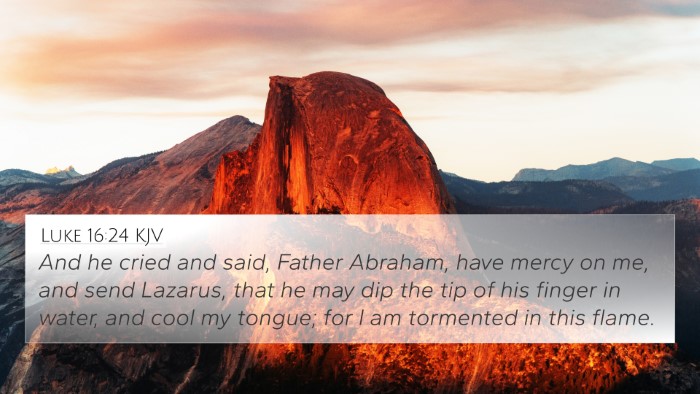
Luke 16:24 (KJV) »
And he cried and said, Father Abraham, have mercy on me, and send Lazarus, that he may dip the tip of his finger in water, and cool my tongue; for I am tormented in this flame.
Job 20:21 Verse Analysis and Similar Verses
Understanding Job 20:21
The verse in focus, Job 20:21, reads: "There shall none of his meat be left; therefore shall no man look for his goods." This verse can be perplexing, but through the lens of various public domain commentaries, we can extract valuable insights and meaning.
Summary of Interpretations
Commentaries by Matthew Henry, Albert Barnes, and Adam Clarke provide a nuanced understanding of this verse, examining the transient nature of earthly possessions in the face of divine judgment. Below, we summarize these interpretations.
-
Matthew Henry's Commentary:
Henry emphasizes how the verse reflects the fate of the wicked, stressing that their actions lead to consequences. The imagery of sustenance disappearing is indicative of the fleeting nature of wealth and the ultimate futility of material possessions in light of divine retribution.
-
Albert Barnes' Notes:
Barnes reinforces the idea that the prosperity of the wicked is temporary. He notes that the abundance that they accumulate will eventually be gone, leaving them with nothing. This serves as a warning about the pursuit of wealth at the expense of morality.
-
Adam Clarke's Commentary:
Clarke discusses the implications of this verse within the broader context of Job's dialogues with his friends. He highlights that the verse signifies that the wicked may have many goods temporarily, but ultimately, they come to ruin and their goods will not stand with them in the day of judgment.
Thematic Connections
This verse can be related to several key themes within the Bible. Here are some notable Bible verse cross-references:
- Psalms 37:1-2: "Fret not thyself because of evildoers, neither be thou envious against the workers of iniquity. For they shall soon be cut down like the grass, and wither as the green herb." - This verse echoes the fleeting success of the wicked.
- Matthew 6:19-20: "Lay not up for yourselves treasures upon earth, where moth and rust doth corrupt, and where thieves break through and steal: but lay up for yourselves treasures in heaven..." - This connects by contrasting earthly riches with eternal rewards.
- Proverbs 11:4: "Riches profit not in the day of wrath: but righteousness delivereth from death." - This proves the point that material wealth is ultimately of no benefit when facing divine judgment.
- Ecclesiastes 5:15: "As he came forth of his mother's womb, naked shall he return to go as he came, and shall take nothing of his labor, which he may carry away in his hand." - This highlights the inevitability of leaving all earthly possessions behind.
- Luke 12:20: "But God said unto him, Thou fool, this night thy soul shall be required of thee: then whose shall those things be, which thou hast provided?" - A reminder of the unexpected nature of life and the futility of hoarding wealth.
- 1 Timothy 6:7: "For we brought nothing into this world, and it is certain we can carry nothing out." - Reiterates the truth of Job 20:21 about the temporary nature of material wealth.
- James 1:10: "But the rich, in that he is made low: because as the flower of the grass he shall pass away." - Another biblical proclamation on the transience of the rich.
Connections Between Bible Verses
Job 20:21 opens the door for comparative Bible verse analysis, allowing us to see how this idea of fleeting riches is a common theme within the Scriptures. Notably:
- The verse invites readers to reflect on the Thematic Bible verse connections between suffering, judgment, and the impermanence of life.
- It highlights the Bible verse parallels found in both the Old and New Testaments regarding the disposition of the rich and the fate of the unrighteous.
Cross-Referencing Biblical Texts
Scriptural cross-referencing not only enriches our understanding of Job 20:21 but also demonstrates the interconnectedness of biblical teachings. The following techniques can be helpful for believers seeking deeper insight:
- Using a Bible Concordance: This tool can help identify where similar themes and messages occur across various books of the Bible.
- Bible Cross-Reference Guide: Such guides often illustrate how different themes correspond with each other, allowing readers to trace concepts across Scripture.
- Cross-Referencing Bible Study: Engaging in structured study practices, including cross-referencing, can amplify understanding and retention of scriptural truths.
Conclusion
In conclusion, Job 20:21 serves as a profound reminder of the ephemeral nature of worldly possessions and the ultimate consequences of living a life contrary to God's will. Through the combined insights of Matthew Henry, Albert Barnes, and Adam Clarke, along with the rich network of cross-references, we can appreciate the depth of this passage in the context of the entire biblical narrative.
For further study and understanding, exploring how to find cross-references in the Bible can provide additional layers of meaning. Furthermore, studying the links between the Prophets and Apostolic teachings can illuminate how this theme has been prevalent throughout scripture, encouraging us to seek everlasting treasures rather than temporary gains.

